“Change is coming.” That was the mantra repeated over and over on Oscar night, as the entire film industry, from old guard studio execs to millennials, cheered and roared for the one movie they really wanted to win: “Parasite.”
It had been building, slowly and steadily, since the Cannes Palme d’Or win for Bong Joon Ho, who may be the closest thing to this generation’s genre-master Hitchcock. Bong’s expert mix of comedy, thriller, and social critique wowed audiences all over the world, helped in no small part by a cadre of fiercely loyal independent distributors who pushed the film, territory by territory, into a global hit ($140 million foreign), from the UK to France to Korea itself.
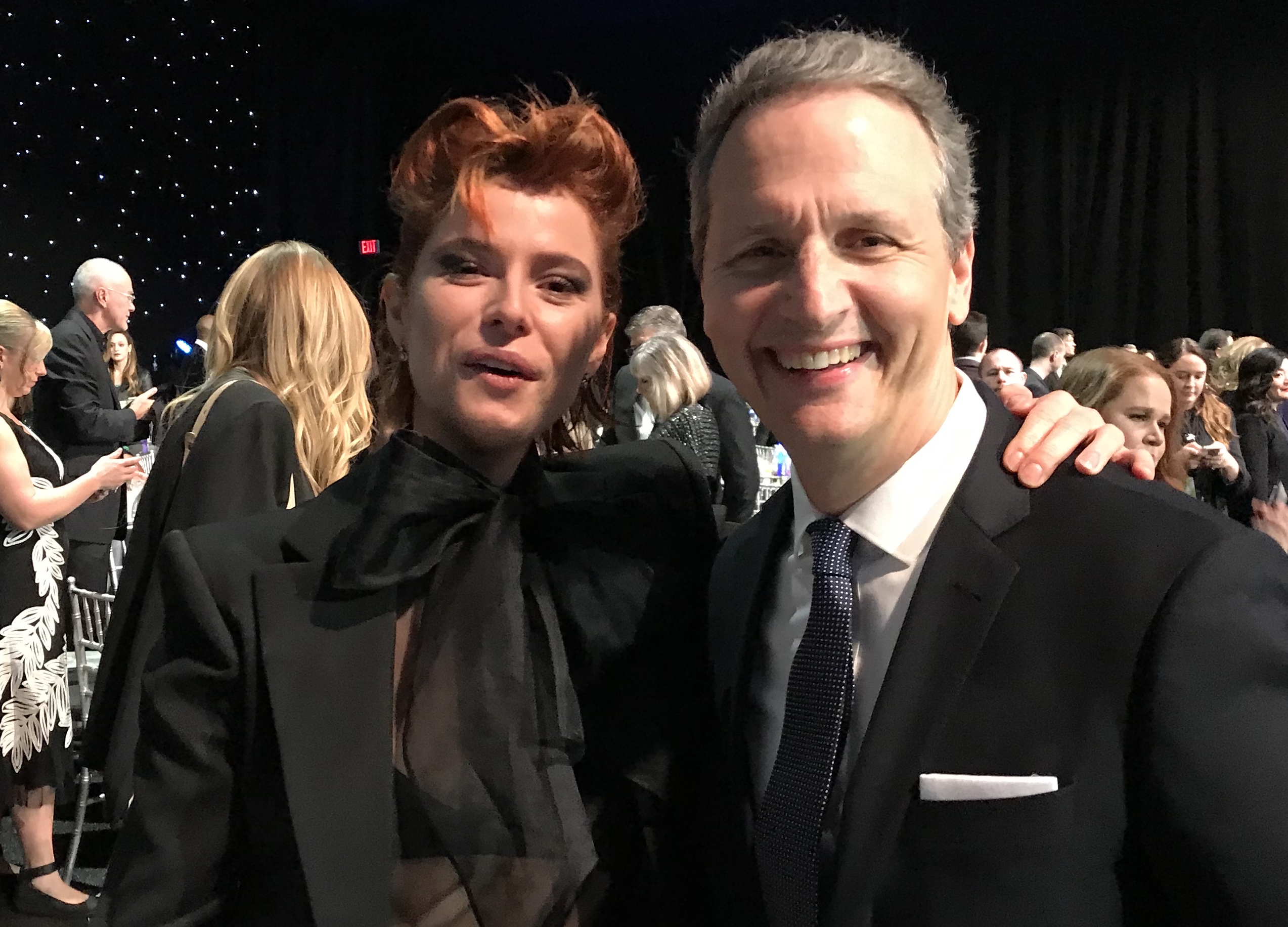
“Wild Rose” star Jessie Buckley and Neon’s Tom Quinn.
Anne Thompson
Neon’s Tom Quinn was a long-time Bong fan who bought the film at the script stage and orchestrated a deliberate theatrical rollout ($35 million domestic and counting). When Bong had a brief meltdown after Telluride and Toronto from the surge of press attention, his team told him that he had to commit. And that he did. He moved his family to an apartment in Los Angeles. He showed up (to warm applause) at every event, from the big ensemble win at the SAG Award (a clue to huge support from the dominant actors’ wing of the Academy), to the WGA and Indie Spirits, and gave off-the-cuff authentic speeches each time (aided by his translator, whose own life has been changed). In short, Bong charmed Hollywood. (And he can’t wait to get home to his dog.)
It wouldn’t have worked if the movie wasn’t there. It was accessible, unpredictable, original, smart, funny, and scary. And “Parasite” told us who we are, in every society all over the world. That’s the definition of a zeitgeist hit that is truly universal. Despite the burgeoning hype, when Academy members saw the film — which never left theaters from its opening on October 11 — they weren’t disappointed.
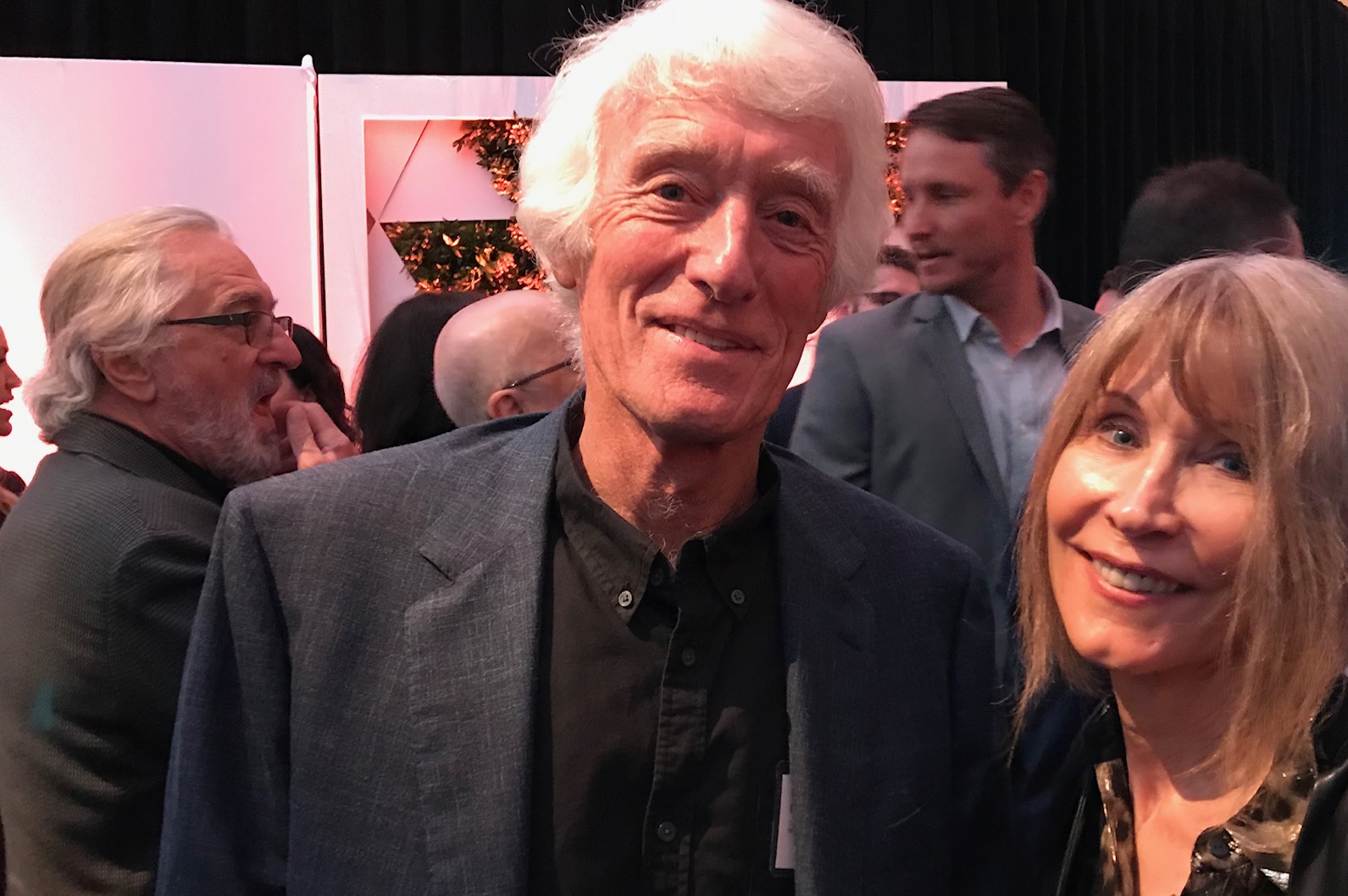
Roger and James Deakins at the Academy nominees luncheon
Anne Thompson
On the preferential Best Picture ballot, supporters of “1917,” “Once Upon a Time in Hollywood,” “The Irishman,” “Joker,” “Jojo Rabbit,” and others voted for their number-one choice, and enough people put “Parasite” at or near the top of their rankings. All the buzz around it made it a must-see, and the Academy also made all the international nominees easier to see via their website or via Apple TV. Then, when people caught up with it, they discovered the hype was real. “The movie sold itself,” said one Neon staffer at the Soho House after party, which kept partygoers waiting to get in.
At Universal’s pre-Oscar “1917” celebration at Spago, you could feel the “Parasite” anxiety. The studio played its cards perfectly with a year-end box office surge, and Sam Mendes’ impeccably executed World War I movie handily won three Oscars, for Best Cinematography, Sound Mixing and VFX. But that was it.
Nothing could beat “Parasite,” which became the first Korean movie to win an Oscar when Bong won Best Original Screenplay, beating Quentin Tarantino, whom Bong later thanked for being a longtime champion. (“Parasite” is the first non-English-language movie to win that category since Pedro Almodovar’s “Talk to Her” 17 years ago.) That win was followed by Best International Feature Film, as expected, Best Director, upsetting Mendes, and Best Picture — the first Korean film, and the only foreign-language film to win in 90 years. Another rule broken. A movie, if popular and well screened, can win both.
I’ve attended many Oscars, and while “Moonlight” comes close as an independent film the Hollywood community rallied behind and pushed for the win, I’ve never seen the rousing energy, the celebration, the cheering and stamping and yelling “Parasite” inspired. Everyone, it seemed, even rival studios, wanted Bong Joon Ho to win. It almost felt political, as though the moderate Democrats (or even the Republicans) had won last year, while this time it was the Liberal Democrats. “If we can go ‘Green Book’ to ‘Parasite,'” read one Tweet, “we can go Trump to Warren.”
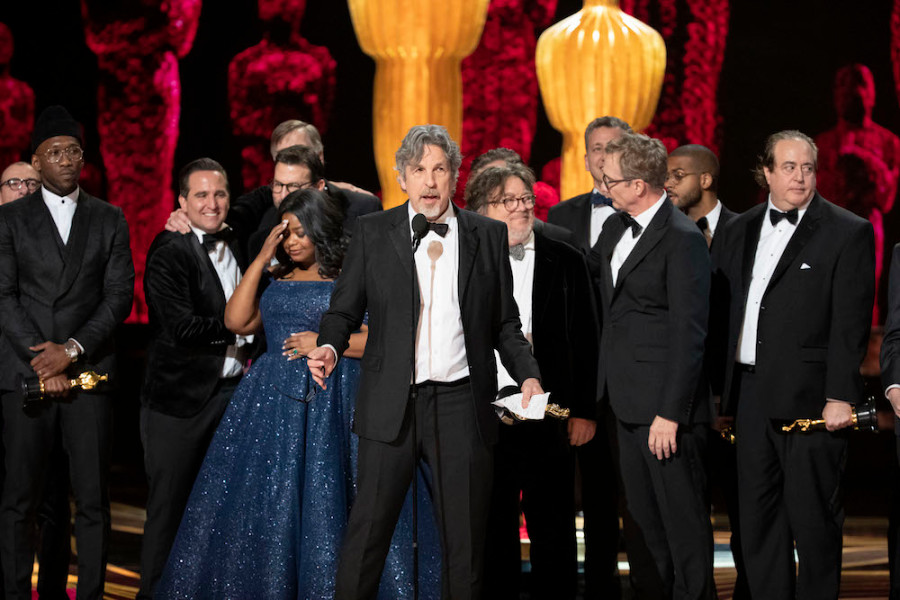
The cast and producers of “Green Book” at the 2019 Academy Awards
ABC/Craig Sjodin
The Oscars are always about how Hollywood wants to see itself. Last year, the Oscar narrative was defined by sharply divided camps. Studio partisans united behind an old-fashioned message movie — Participant/Universal’s “Green Book” — against streaming behemoth big-spender Netflix and its black-and-white subtitled art film “Roma.”
This year, the Academy, with an expanded membership of 8,469 with almost 20 percent international voters, wanted to send a different message of inclusion. While the 2020 Oscar nominations were dominated by nostalgic looks back at another time, those old-boy movies had to settle for a small piece of the Oscar pie. “Ford v. Ferrari” won two Oscars, for Best Editing and Sound Editing, “Once Upon a Time in Hollywood” won two, for Production Design and Supporting Actor Brad Pitt, “Joker” won two for Best Actor Joaquin Phoenix and Original Score, and Netflix’s “The Irishman” went home with nothing. (Here’s why.)
At the Governors Ball, Netflix content chief Ted Sarandos said he was happy with his two wins, and the 24 nominations that sent viewers to Netflix. That’s his mission. Did negative campaigning or studio vitriol divebomb Netflix’s chances? The streamer uses film festivals and a short theatrical limited release to push their movies onto their platform. Instead of going wide in theaters, they go wide on Netflix across the globe, in 190 countries. But they lost the extra boost seeing movies in theaters can bring. “Parasite” road that wave.
Read More: Oscars 2020: The Compete Winners’ List
Netflix is facing increased competition from other streamers including the swiftly expanding Disney+, led by Bob Iger, who purchased Twentieth Century Fox. Sound editing winner Donald Sylvester mourned the loss of one of the great Hollywood studios when he accepted his award: “‘Ford v Ferrari’ is probably the last movie ever made by 20th Century Fox.”
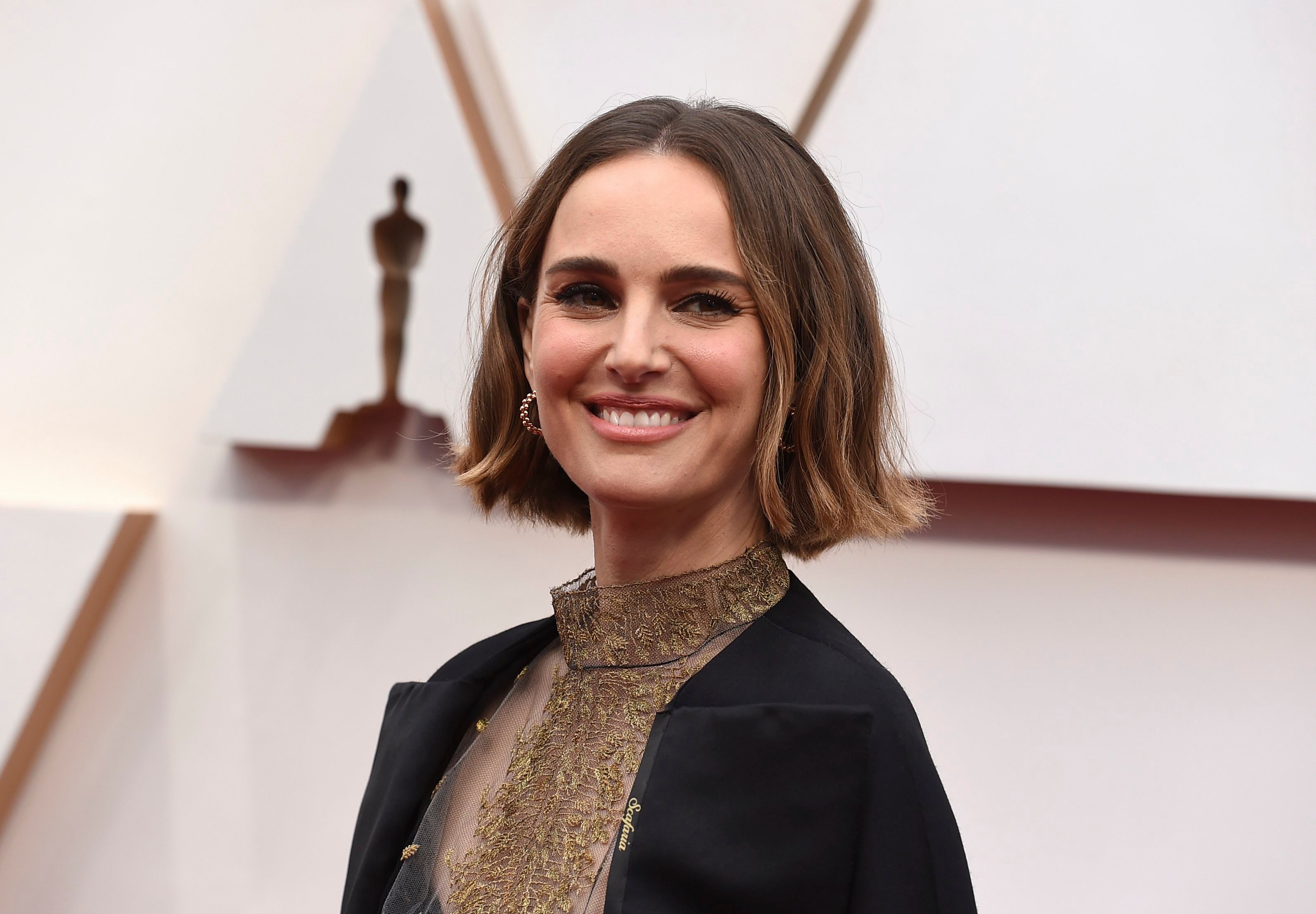
Natalie Portman
Jordan Strauss/Invision/AP/Shutterstock
Rookie Oscar show producers Stephanie Allain (“Hustle & Flow”) and Lynette Howell-Taylor (“A Star Is Born”) had to cope with a tighter schedule than usual between the Oscar nominations and the show — just four weeks, and their production team was also in demand at precursor award shows. With theatrical backgrounds, Allain and Howell-Taylor wanted to cram as much music as they could into the show, with hipper musical numbers from the likes of Janelle Monae (“Come Alive”), “Harriet” Oscar nominee Cynthia Erivo (“Stand Up”) and, for no immediately apparent reason, Eminem (“Lose Yourself” from “8 Mile”).
In an email, Howell-Taylor ascribed the Eminem appearance to the show’s theme, which was the impact of storytelling. “We wanted to do a segment on the impact of songs in movies,” she wrote. “Eminem and 8 Mile is such an impactful moment and given that he didn’t attend the show when he won the Oscar 18 years ago we asked if he wanted to perform this year. Plus it’s so hard to surprise anyone these days and we worked hard to give audiences something they were not expecting!”
Monae and Eminem were both “phenomenal performers,” said Allain at the Governors Ball. “It’s always hard to get great people. For us the show was about impact, filmmaking, storytelling and music. We reached out to people who had impact.”
Howell-Taylor brought in singers from multiple countries to join Idina Menzel to sing “Into the Unknown.” “All these women are superstars in their countries, bigger than Beyonce,” said Allain. “We think of the show as a global show. We wanted to bring that home. ‘Parasite’ winning is a sea change.”
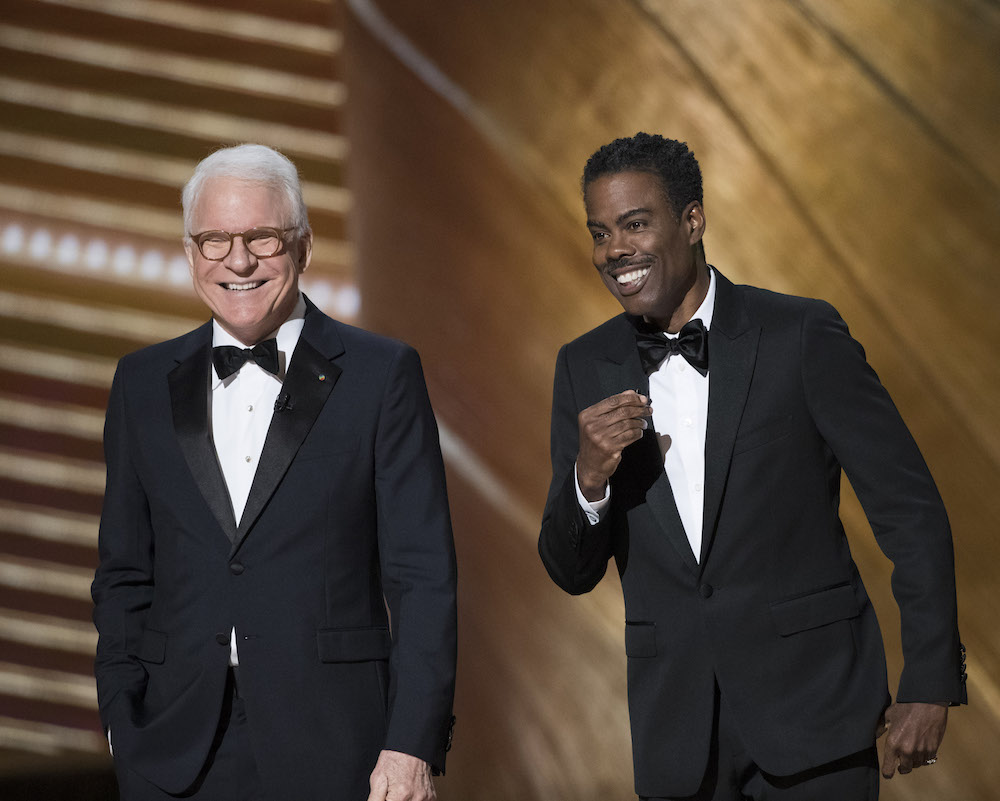
Steve Martin and Chris Rock at the 2020 Oscars
ABC / CRAIG SJODIN
The most woke Oscars ever persistently reminded viewers (and the Academy itself) of their shortcomings. All night, presenters and winners mentioned the ways that this year’s #Oscarsowhite came up short. Steve Martin and Chris Rock, who both wrote their own material, underscored the lack of black acting nominees (as well as “vaginas”) among the directors. Presenter Natalie Portman had a list of snubbed women directors embroidered onto her Dior cape. (Bespoke outfits were trending: Spike Lee displayed Kobe Bryant’s Lakers number 24 on his suit, and “The Irishman” costume designer Sandy Powell had nominees sign her white toile pantsuit for charity.)
Backstage, “Marriage Story” Supporting Actress winner Laura Dern, who also starred in “Little Women,” said, “If I could give this Oscar to Greta Gerwig, I would right now.” For her part, Gerwig was beaming with delight for her first movie to score an Oscar (“Lady Bird” boasted five nominations, no wins). At the Governor’s Ball, like many award shows this season, Gerwig crossed from the Sony corner (where Pitt and Leonardo DiCaprio were cordoned off to munch their sushi and salmon pizza in peace) over to the Netflix section, and back into the arms of her beaming partner Noah Baumbach. Tied with six nominations apiece, at the end of night, each of their movies won one Oscar: Supporting Actress for “Marriage Story” and Costume Design for “Little Women.”
Clearly, the Oscars fell at a politically charged time in America. From the start, Pitt left behind his quip-filled speeches to go more sincere: “I have only 45 seconds to say thank you, which is 45 seconds more than John Bolton had this week,” and reflected back to his career breakout in “Thelma and Louise.” “‘Once Upon a Time in Hollywood.’ Ain’t that the truth.”
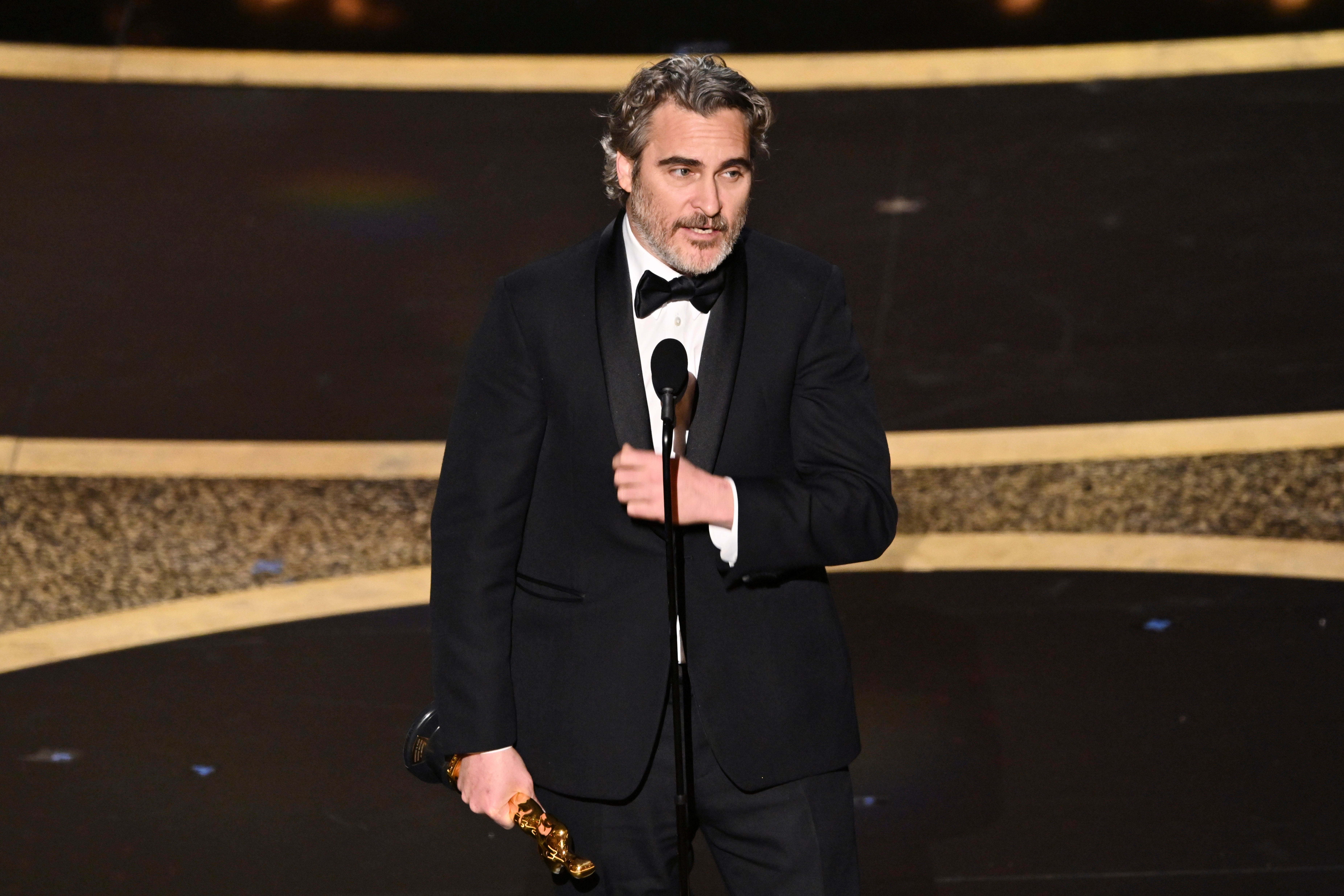
Joaquin Phoenix
Rob Latour/Shutterstock
“Joker” Best Actor winner Joaquin Phoenix, who wrote all his own speeches during Oscar season (nobody tells him what to do, one Warner Bros. executive told me) jumped the shark with his criticism of dairy farming methods, but pulled it out in the end: “That’s when we’re at our best,” he said, “when we support each other. Not when we cancel each other out for past mistakes, but when we help each other to grow, when we educate each other, when we guide each other toward redemption.”
At the Governors Ball, one studio chairman said he objected to being lectured to by the Oscars about what he should think. Did viewers at home feel the same? In recent years the liberal-leaning Oscars have alienated many in mainstream America, and many tuned out of this one, too: it boasted the lowest ratings ever (5.3, adults 18-49) with 23.6 million viewers, a 20 percent drop- from last year. Still, it’s the top-rated among awards shows, which have all seen recent declines.
Oscars 2020 belonged to Bong and his “Parasite” crew. Bong elegantly orchestrated a standing ovation for Martin Scorsese, and when he entered the Governors’ Ball, apologized to the engravers for clutching three Oscars. Going forward, more filmmakers, whatever their spoken language, will be lauded in multiple categories by the Oscars. That’s partly because Netflix and Apple have added one positive thing to world culture: generations of movie lovers who can watch and read at the same time.
It had been building, slowly and steadily, since the Cannes Palme d’Or win for Bong Joon Ho, who may be the closest thing to this generation’s genre-master Hitchcock. Bong’s expert mix of comedy, thriller, and social critique wowed audiences all over the world, helped in no small part by a cadre of fiercely loyal independent distributors who pushed the film, territory by territory, into a global hit ($140 million foreign), from the UK to France to Korea itself.

“Wild Rose” star Jessie Buckley and Neon’s Tom Quinn.
Anne Thompson
Neon’s Tom Quinn was a long-time Bong fan who bought the film at the script stage and orchestrated a deliberate theatrical rollout ($35 million domestic and counting). When Bong had a brief meltdown after Telluride and Toronto from the surge of press attention, his team told him that he had to commit. And that he did. He moved his family to an apartment in Los Angeles. He showed up (to warm applause) at every event, from the big ensemble win at the SAG Award (a clue to huge support from the dominant actors’ wing of the Academy), to the WGA and Indie Spirits, and gave off-the-cuff authentic speeches each time (aided by his translator, whose own life has been changed). In short, Bong charmed Hollywood. (And he can’t wait to get home to his dog.)
It wouldn’t have worked if the movie wasn’t there. It was accessible, unpredictable, original, smart, funny, and scary. And “Parasite” told us who we are, in every society all over the world. That’s the definition of a zeitgeist hit that is truly universal. Despite the burgeoning hype, when Academy members saw the film — which never left theaters from its opening on October 11 — they weren’t disappointed.

Roger and James Deakins at the Academy nominees luncheon
Anne Thompson
On the preferential Best Picture ballot, supporters of “1917,” “Once Upon a Time in Hollywood,” “The Irishman,” “Joker,” “Jojo Rabbit,” and others voted for their number-one choice, and enough people put “Parasite” at or near the top of their rankings. All the buzz around it made it a must-see, and the Academy also made all the international nominees easier to see via their website or via Apple TV. Then, when people caught up with it, they discovered the hype was real. “The movie sold itself,” said one Neon staffer at the Soho House after party, which kept partygoers waiting to get in.
At Universal’s pre-Oscar “1917” celebration at Spago, you could feel the “Parasite” anxiety. The studio played its cards perfectly with a year-end box office surge, and Sam Mendes’ impeccably executed World War I movie handily won three Oscars, for Best Cinematography, Sound Mixing and VFX. But that was it.
Nothing could beat “Parasite,” which became the first Korean movie to win an Oscar when Bong won Best Original Screenplay, beating Quentin Tarantino, whom Bong later thanked for being a longtime champion. (“Parasite” is the first non-English-language movie to win that category since Pedro Almodovar’s “Talk to Her” 17 years ago.) That win was followed by Best International Feature Film, as expected, Best Director, upsetting Mendes, and Best Picture — the first Korean film, and the only foreign-language film to win in 90 years. Another rule broken. A movie, if popular and well screened, can win both.
I’ve attended many Oscars, and while “Moonlight” comes close as an independent film the Hollywood community rallied behind and pushed for the win, I’ve never seen the rousing energy, the celebration, the cheering and stamping and yelling “Parasite” inspired. Everyone, it seemed, even rival studios, wanted Bong Joon Ho to win. It almost felt political, as though the moderate Democrats (or even the Republicans) had won last year, while this time it was the Liberal Democrats. “If we can go ‘Green Book’ to ‘Parasite,'” read one Tweet, “we can go Trump to Warren.”

The cast and producers of “Green Book” at the 2019 Academy Awards
ABC/Craig Sjodin
The Oscars are always about how Hollywood wants to see itself. Last year, the Oscar narrative was defined by sharply divided camps. Studio partisans united behind an old-fashioned message movie — Participant/Universal’s “Green Book” — against streaming behemoth big-spender Netflix and its black-and-white subtitled art film “Roma.”
This year, the Academy, with an expanded membership of 8,469 with almost 20 percent international voters, wanted to send a different message of inclusion. While the 2020 Oscar nominations were dominated by nostalgic looks back at another time, those old-boy movies had to settle for a small piece of the Oscar pie. “Ford v. Ferrari” won two Oscars, for Best Editing and Sound Editing, “Once Upon a Time in Hollywood” won two, for Production Design and Supporting Actor Brad Pitt, “Joker” won two for Best Actor Joaquin Phoenix and Original Score, and Netflix’s “The Irishman” went home with nothing. (Here’s why.)
At the Governors Ball, Netflix content chief Ted Sarandos said he was happy with his two wins, and the 24 nominations that sent viewers to Netflix. That’s his mission. Did negative campaigning or studio vitriol divebomb Netflix’s chances? The streamer uses film festivals and a short theatrical limited release to push their movies onto their platform. Instead of going wide in theaters, they go wide on Netflix across the globe, in 190 countries. But they lost the extra boost seeing movies in theaters can bring. “Parasite” road that wave.
Read More: Oscars 2020: The Compete Winners’ List
Netflix is facing increased competition from other streamers including the swiftly expanding Disney+, led by Bob Iger, who purchased Twentieth Century Fox. Sound editing winner Donald Sylvester mourned the loss of one of the great Hollywood studios when he accepted his award: “‘Ford v Ferrari’ is probably the last movie ever made by 20th Century Fox.”

Natalie Portman
Jordan Strauss/Invision/AP/Shutterstock
Rookie Oscar show producers Stephanie Allain (“Hustle & Flow”) and Lynette Howell-Taylor (“A Star Is Born”) had to cope with a tighter schedule than usual between the Oscar nominations and the show — just four weeks, and their production team was also in demand at precursor award shows. With theatrical backgrounds, Allain and Howell-Taylor wanted to cram as much music as they could into the show, with hipper musical numbers from the likes of Janelle Monae (“Come Alive”), “Harriet” Oscar nominee Cynthia Erivo (“Stand Up”) and, for no immediately apparent reason, Eminem (“Lose Yourself” from “8 Mile”).
In an email, Howell-Taylor ascribed the Eminem appearance to the show’s theme, which was the impact of storytelling. “We wanted to do a segment on the impact of songs in movies,” she wrote. “Eminem and 8 Mile is such an impactful moment and given that he didn’t attend the show when he won the Oscar 18 years ago we asked if he wanted to perform this year. Plus it’s so hard to surprise anyone these days and we worked hard to give audiences something they were not expecting!”
Monae and Eminem were both “phenomenal performers,” said Allain at the Governors Ball. “It’s always hard to get great people. For us the show was about impact, filmmaking, storytelling and music. We reached out to people who had impact.”
Howell-Taylor brought in singers from multiple countries to join Idina Menzel to sing “Into the Unknown.” “All these women are superstars in their countries, bigger than Beyonce,” said Allain. “We think of the show as a global show. We wanted to bring that home. ‘Parasite’ winning is a sea change.”

Steve Martin and Chris Rock at the 2020 Oscars
ABC / CRAIG SJODIN
The most woke Oscars ever persistently reminded viewers (and the Academy itself) of their shortcomings. All night, presenters and winners mentioned the ways that this year’s #Oscarsowhite came up short. Steve Martin and Chris Rock, who both wrote their own material, underscored the lack of black acting nominees (as well as “vaginas”) among the directors. Presenter Natalie Portman had a list of snubbed women directors embroidered onto her Dior cape. (Bespoke outfits were trending: Spike Lee displayed Kobe Bryant’s Lakers number 24 on his suit, and “The Irishman” costume designer Sandy Powell had nominees sign her white toile pantsuit for charity.)
Backstage, “Marriage Story” Supporting Actress winner Laura Dern, who also starred in “Little Women,” said, “If I could give this Oscar to Greta Gerwig, I would right now.” For her part, Gerwig was beaming with delight for her first movie to score an Oscar (“Lady Bird” boasted five nominations, no wins). At the Governor’s Ball, like many award shows this season, Gerwig crossed from the Sony corner (where Pitt and Leonardo DiCaprio were cordoned off to munch their sushi and salmon pizza in peace) over to the Netflix section, and back into the arms of her beaming partner Noah Baumbach. Tied with six nominations apiece, at the end of night, each of their movies won one Oscar: Supporting Actress for “Marriage Story” and Costume Design for “Little Women.”
Clearly, the Oscars fell at a politically charged time in America. From the start, Pitt left behind his quip-filled speeches to go more sincere: “I have only 45 seconds to say thank you, which is 45 seconds more than John Bolton had this week,” and reflected back to his career breakout in “Thelma and Louise.” “‘Once Upon a Time in Hollywood.’ Ain’t that the truth.”

Joaquin Phoenix
Rob Latour/Shutterstock
“Joker” Best Actor winner Joaquin Phoenix, who wrote all his own speeches during Oscar season (nobody tells him what to do, one Warner Bros. executive told me) jumped the shark with his criticism of dairy farming methods, but pulled it out in the end: “That’s when we’re at our best,” he said, “when we support each other. Not when we cancel each other out for past mistakes, but when we help each other to grow, when we educate each other, when we guide each other toward redemption.”
At the Governors Ball, one studio chairman said he objected to being lectured to by the Oscars about what he should think. Did viewers at home feel the same? In recent years the liberal-leaning Oscars have alienated many in mainstream America, and many tuned out of this one, too: it boasted the lowest ratings ever (5.3, adults 18-49) with 23.6 million viewers, a 20 percent drop- from last year. Still, it’s the top-rated among awards shows, which have all seen recent declines.
Oscars 2020 belonged to Bong and his “Parasite” crew. Bong elegantly orchestrated a standing ovation for Martin Scorsese, and when he entered the Governors’ Ball, apologized to the engravers for clutching three Oscars. Going forward, more filmmakers, whatever their spoken language, will be lauded in multiple categories by the Oscars. That’s partly because Netflix and Apple have added one positive thing to world culture: generations of movie lovers who can watch and read at the same time.

